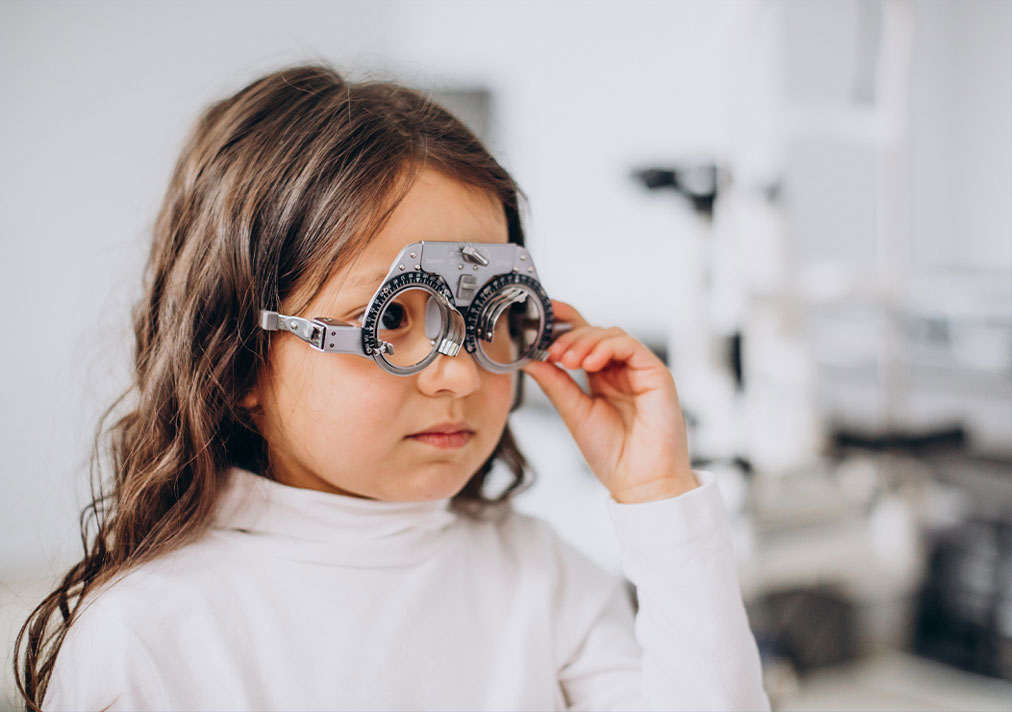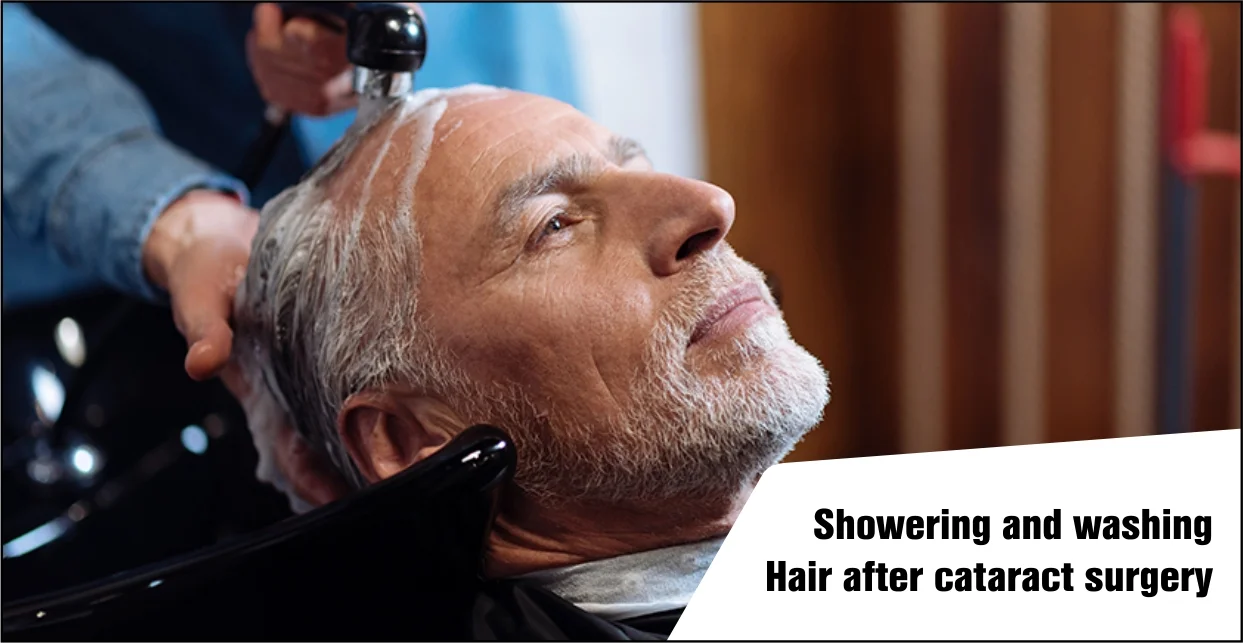Although having a cataract surgery might feel like a big deal, it is actually a rather short and painless process that has a big impact on your eyesight. Despite how straightforward the procedure may be, extra attention is needed throughout the healing phase. How should I handle everyday tasks like showering and washing hair after cataract surgery, is a topic that patients ask a lot while they are recovering.
Even though it might not seem like much, it is really important to look for yourself in the initial days following surgery. After the surgery, your eyes are extremely vulnerable, so you will want to prevent any issues that could occur from accidentally putting shampoo, soap, or water in them. We’ll go over the essentials for properly showering and cleaning your hair following cataract surgery as well as the best ways to guarantee a speedy recuperation.
Why Exercise Caution After Cataract Surgery?
Before delving into the particulars of showering and washing hair after cataract surgery, it is critical to comprehend the reasons for the extra care required. During cataract surgery, the clouded lens in your eye is removed and replaced with an IOL (intra-ocular lens) Because of the sensitive nature of this treatment, your eyes will require time to recuperate.
Your eye is susceptible to infection and discomfort in the initial days following surgery. Complications like swelling infections or slowed recovery can be caused by water, shampoo, soap, or even just the pressure of rubbing your eyes. For this reason, it is critical to safeguard your eyes according to the recommended shower and hair-washing procedures.
Should You Take A Shower After Cataract Surgery?
The good news is yes you can take a shower following cataract surgery. To protect your recovering eyes, however, you will need to take some measures.
Day one: It is advised that you do not take a shower all day on the day of the procedure. Recovery is most benefited by avoiding water contact with the eyes for the first 24 hours following surgery.
Day two and after: You can start taking a shower again the day after your operation but you should use caution. Particularly in the initial few days pay attention to keeping your face and eyes dry. Tilt your head back when taking a shower to avoid getting water on your face. Wash your face gently with the washcloth or sponge, being care careful not to splash water on your eyes.
Tips For Having A Safe Shower After Cataract Surgery
Here are some essential guidelines for showering and washing hair after cataract surgery, to make sure you are maintaining hygiene while protecting your eyes:
Do not get direct water flow on your face: When taking a shower it is important to keep water out of your eyes. When washing your hair or insing the body keep your head back to prevent soap or water from getting into your eyes.
Use Lukewarm Water: Steam from hot water might irritate and pain your eyes. For baths, use warm water instead of hot, as it is calming and less irritating.
Treat Your Face Gently: Try not to wash your face in the shower during the first week. Instead, wipe your face with a moist, gentle cloth, being careful not to get near your eyes. This will lessen the chance of any unintentional water splashes.
Refrain from Rubbing Your Eyes: Although it may be alluring to remove shampoo or water from moist eyes, doing so might press on the recovering eye and impede its recovery. When in doubt, always dab lightly, but make an effort to keep your eyes dry.
Think About Wearing Protective Eyewear: You can use eye protection when taking a shower if you are worried about soap or water spilling into your eyes. By taking this little precaution, you may lessen the chance of water pouring into your eyes and feel more at ease.
Ways to Shampoo Your Hair Following Cataract Surgery
After cataract surgery, shampooing your hair needs more thought than usual. Care for your head and hair is still necessary, but it must be done so without jeopardising your recuperation.
Bend Back Rather Than Forward: Refrain from cocking your head forward when shampooing. To prevent water and shampoo from getting in your face and eyes, lean your head backwards, just like you would in a salon. This helps shield your eyes from unintentional contact with shampoo or soap.
Seek Assistance: It is advisable to have assistance washing your hair during the initial days. In this manner, you may wash your hair while someone else does it, keeping your eyes shut and dry. If you are concerned that water may get inadvertently in your eyes, this is very helpful.
Use A Gentle Shampoo: During your recuperation, it is beneficial to change to a mild, soft shampoo, even though your primary concern will be preventing shampoo from getting into your eyes. Pick a gentle shampoo instead of a harsh one with powerful chemicals, and stay away from scented or medicated items for the initial days.
Use Caution When Towel Drying: After shampooing your hair, take care not to massage your head excessively with a towel. Water droplets could get into the eyes as a result of the vigorous rubbing. Instead, give your hair a gentle pat dry.
What Is the Duration of These Precautions?
Knowing the basics of showering and washing hair after cataract surgery may have you wondering how long you need to continue taking these measures.
The most crucial time, during which the eyes are particularly susceptible, is the first week for the majority of patients. You can gradually go back to your regular bathing and shampooing your hair schedule after your initial week, but you should still refrain from sprinkling soap or water in your eyes.
You should be able to get back to all of your normal hygiene routines around after a month, but it is advisable to see your doctor at follow-up sessions to make sure your eyes are recovering well.
Typical Mistakes To Avoid While Recovering
Following cataract surgery, there are some frequent mistakes individuals occasionally make when it involves their recuperation. A smooth recovery may be ensured by knowing what to avoid. The following are a few things to be mindful of:
Ignoring the eye shield: During the first week in particular, your doctor should have given you eye protection to wear at night. Do not neglect this step since it can interfere with the healing process if you rub your eyes as you sleep or accidentally touch them.
Cleaning your eyes after contact with water: Mishaps occur despite great efforts. If you do get shampoo or water in your eyes, try not to rub them. Instead, wipe the wetness away with a clean cloth, being careful.
Taking on demanding tasks too soon: You should refrain from doing things like lifting heavy objects, leaning forward, and swimming when your eyes are healing. Your eyes may be compressed by this or come into contact with water, which raises the possibility of problems.
A speedy recovery depends on you adhering to these recommendations as well as your doctor’s orders. Never hesitate to seek advice from your doctor if you have questions or concerns about any part of your recuperation.
Last Things to Do and Not Do After Cataract Surgery
It will greatly improve your recuperation if you adhere to the do’s and don’ts after cataract surgery. It is important to be aware of what you do, protect and dry your eyes, and adhere to your doctor’s prescription regimen for eye drops and medications. By following these measures, you may ensure a smooth recovery by avoiding issues such as infections or delayed healing. One should take precautions after cataract operation.
Never forget that little things like showering and washing hair after cataract surgery might seem insignificant, but they really matter a lot. By taking the extra time to do these daily tasks with caution, you may shield your eyes from substances like water, detergent, or shampoo that could irritate or damage your healing eyes. Being careful in the beginning will have a big impact on how well your recovery goes in the long run.
Takeaway – Take Care of Your Eyes, Take Care of Your Healing
Ultimately, managing your eyes following cataract surgery entails implementing little changes to your daily schedule to aid in the recovery process. Showering and washing hair after cataract surgery needs special attention in the first few weeks, but you may resume your regular activities as soon as your eyes recover.
The knowledgeable staff at Eye-Q Super-Speciality Hospitals is there to assist you at every stage of the process, whether you are getting ready for cataract surgery or are already recuperating from it. Eye-Q is the greatest eye hospital in India with decades of expertise in cataract surgery and eye care, guaranteeing each patient receives the finest possible care and attention.
Are you prepared to go towards a more defined vision? Make an appointment with Eye-Q Super-Speciality Hospitals right away to receive professional guidance and individualised treatment as you heal!
FAQ’s
-
Can I bathe just after the cataract surgery?
Post cataract surgery, you have to avoid showering for about the first 24 hours. It’s because your eyes during the Thai timeline are more vulnerable, and it’s vital to keep them dry and protected. During this time, the eye surgeon will advise you to cover your eyes with a special protective shield, which will remain in place for a time after cataract surgery. Also, after 24 hours, wash your hair using a salon-type method, such as leaning back over a sink or bathtub, to reduce the risk of water or shampoo running into your eyes.
-
What are some dos and don’ts after cataract surgery in terms of bathing?
After successful cataract surgery, patients have to take proper care of their eyes, and must keep in mind some dos and don’ts:
Do’s
- Must follow your eye surgeon’s guidelines.
- Must use clean towels to pat your face to dry gently
- Wear a protective eye shield as recommended.
- Wash your hands more often before touching your eye area.
Don’t
- Avoid submerging your head underwater in a bath for about two weeks.
- Avoid swimming in pools
- Avoid hot tubs or saunas for about a month post-cataract surgery
- Avoid any type of eye makeup around the eye area for the first week.
-
When you must seek medical help?
Complications after cataract surgery are rare, so it is vital to be vigilant during the recovery phase. You must contact your eye surgeon immediately if you experience the following:
- A sudden decrease in vision.
- Increased pain in the eye
- Unusual redness or swelling
- Eye discharge
- Flashes of light
-
Is blurriness, as well as eye discomfort, normal post-cataract surgery?
After cataract surgery, it is normal for patients to feel discomfort and experience some sensations in the surgical eye, and all of this is quite normal. Blurry vision, slight redness, and eye scratchiness can be experienced and subside after some time. However, visit your surgeon immediately if you experience vision loss, eye pain, flashing lights, vomiting and nausea.
-
When can patients resume their daily activities, like driving and exercising?
After cataract surgery, patients can resume to all normal light activities :
- The two days after surgery are crucial, and patients should avoid bending over.
- Avoiding activities that can put pressure on your eyes and disturb the healing process is necessary for eye health.
- Driving after cataract surgery takes time, and it’s best to discuss it with your surgeon before doing so.
- Strenuous activities and exercises post cataract surgery may take time. However, you can do light exercises like walking after two days of surgery. But activities like running, biking, etc, can resume after ten to twelve days.
- Reading and watching TV are allowed within a few hours post-surgery, but it is best to avoid them for your eye health as your eyes may need time to adjust to the new lens.
-
-
How many days of rest are required post-cataract surgery?
-
Post cataract surgery, it may take about one to two days of proper rest to resume back-to-light activities; your full recovery may take about a month. The time you give to rest will help your eyes to heal faster. However, in many patients, they can see better within a week post-surgery. You can talk to eye surgeon if eye blurring continues after this.
-
When can I bend over to wash my hair after cataract surgery?
You can bend over after 1 week of cataract surgery. You should not bend over to wash your hair at least 1 week after cataract surgery. Avoid activities that involve picking items from the floor, tying shoelaces, and gardening. In the meantime, you should keep your eyes protected while lying down or sleeping. It is recommended to wear a protective eye mask at night, and keep eyes dry and smooth.
-
When can I get my eyes wet in the shower after cataract surgery?
It’s recommended to keep away from getting water on your eyes for at least 1 week after cataract surgery. You can generally bathe and shower after about every week, but should still keep away from water from directly splashing into your eyes.
-
Can I wash my hair after cataract surgery?
Yes, you can shower and wash your hair after cataract surgery. You should stay away from water, shampoo, or soaps into eyes for the first few weeks. The initial recovery duration, especially the first week, requires more care to prevent contamination.
-
How to wash hair after cataract surgery?
Washing your hair may be a bit trickier than showering, as there’s a high chance of cleaning soap or shampoo entering your eyes. Here how you can wash your hair
- Wait for at least 24 hours after cataract surgery before washing hair.
- Use salon type process for first week:
- Lean returned over a sink or tub.
- Wash your hair with the help of someone, if possible.
- This method reduces the risk of water or shampoo going for walks into your eyes.
- Keep your eyes closed during the hair-washing procedure.
- Use a slight, tear-free shampoo to minimise irritation if it by accident gets in your eye.
- Avoid bending ahead whilst rinsing, as this may put pressure on your healing eye.




